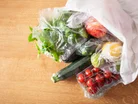Supermarkets Struggle with Plastic Food Packaging Reduction

The food sector is struggling to reduce its reliance on plastic packaging, according to a new study by sustainable packaging company DS Smith. The Material Change Index, which examined 1,500 supermarket products across six European countries, found that 51% of food and drink items in UK stores are packaged in plastic that could be safely substituted with more sustainable alternatives.
This equates to 29.8bn pieces of avoidable plastic waste annually in the UK alone, highlighting the significant environmental impact of the food industry's packaging choices.
Product categories and plastic usage in supermarkets
The DS Smith Material Change Index has revealed the extent of plastic usage in the UK food industry, with processed foods emerging as the primary culprits. Ready meals and meal kits lead the pack, with 90% of these products encased in plastic.
- Rice and cereals 89%
- Dairy products 83%
- Meat and fish 80%
These statistics highlight the food sector's dependence on plastic, particularly for perishable items. The study also positions UK supermarkets as the most plastic-reliant in Europe, with 70% of food and drink items on British shelves containing plastic. This figure surpasses Spain 67%, Italy and Germany both 66%, Poland 62% and France 59%.
Despite 98% of surveyed food manufacturers and retailers claiming to have plastic reduction goals, progress has been sluggish. A quarter of companies admit to falling behind on their packaging targets, most of which are set for 2026.
The sector faces significant hurdles in moving away from plastic packaging. Cost is the primary concern, with 40% of respondents citing the expense of alternative packaging materials as the main obstacle. Consumer reaction is another major worry, with 39% of companies apprehensive about potential backlash to packaging changes.
Consumer attitudes pose challenges to the food sector
The survey indicates that 72% of food manufacturers and retailers believe consumers would be unwilling to pay more for sustainable packaging. Furthermore, 65% think customers would resist compromising convenience for sustainability.
This perceived conflict between environmental responsibility and consumer preferences creates a significant challenge for the industry. There are concerns that while cheaper, unsustainable products remain available, more expensive sustainable alternatives may struggle to sell.
"Good progress has been made but there is evidently a great deal more to do,” said Miles Roberts, Group CEO of DS Smith."We think the government can and should be more demanding of us all — phasing out certain plastics to help create a level playing field that encourages innovation, investment and generates healthy competition to replace plastic.
"With some of the biggest brands in the world we estimate that we have been able to replace more than one billion pieces of plastic over the last four years, but it is the tip of the iceberg and we must do more."
The release of these findings coincides with the anticipated unveiling of the UK government's Circular Economy Strategy and Zero Waste Roadmap. Industry leaders are hopeful that these initiatives will support the adoption of more recyclable materials and accelerate the shift away from unnecessary plastic packaging.
As the 2026 targets draw nearer, the food and drink industry faces mounting pressure to innovate and adapt. The challenge extends beyond developing sustainable packaging solutions to convincing consumers of their value.
With an estimated 29.8bn pieces of avoidable plastic waste generated annually in the UK, the need for prompt and effective action in the food sector is evident.
Make sure you check out the latest edition of Food Digital and also sign up to our global conference series - Sustainability LIVE 2024
Food Digital is a BizClik brand
"With some of the biggest brands in the world we estimate that we have been able to replace more than one billion pieces of plastic over the last four years, but it is the tip of the iceberg and we must do more."
The release of these findings coincides with the anticipated unveiling of the UK government's Circular Economy Strategy and Zero Waste Roadmap. Industry leaders are hopeful that these initiatives will support the adoption of more recyclable materials and accelerate the shift away from unnecessary plastic packaging.
As the 2026 targets draw nearer, the food and drink industry faces mounting pressure to innovate and adapt. The challenge extends beyond developing sustainable packaging solutions to convincing consumers of their value.
With an estimated 29.8bn pieces of avoidable plastic waste generated annually in the UK, the need for prompt and effective action in the food sector is evident.
Make sure you check out the latest edition of Food Digital and also sign up to our global conference series - Sustainability LIVE 2024
Food Digital is a BizClik brand




